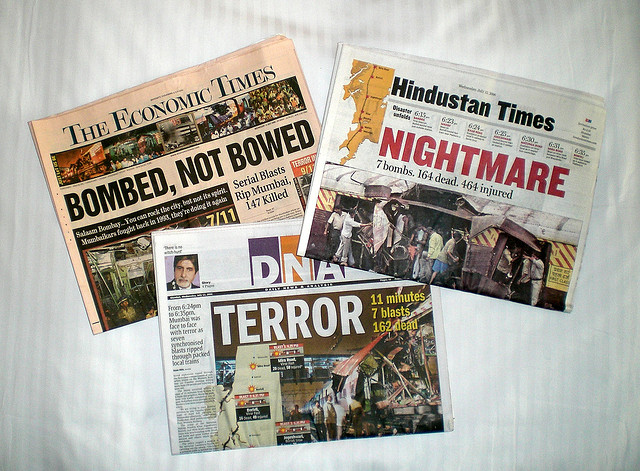"Media negativity creates hurdle for youth attitudes"
January 30th, 2015 News media focused on disaster and scandal can have a strong impact on the outlook of young people writes Carl Konadu, coordinator of the Commonwealth Youth Sport for Development and Peace working group, a network supported by the Commonwealth Youth Programme.
News media focused on disaster and scandal can have a strong impact on the outlook of young people writes Carl Konadu, coordinator of the Commonwealth Youth Sport for Development and Peace working group, a network supported by the Commonwealth Youth Programme.
The media’s negative portrayal of the world is of extreme importance in our society today.
Yet the subject is rarely discussed. In my four years of studying International Relations and Politics there were only a few lectures that focused on the media. Those lectures touched on using the media as a tool for creating ‘moral panic’ or ‘scare mongering’, something that we now see in everyday news.
This negative media is having a huge impact on people in general, and I believe it is particularly harmful to young people. As a young person you’re growing up with media that constantly reports on terrorism, debt, drug abuse, immigration and many other issues that are depressing, negative – adding no positive substance to our minds. This is not to say that these issues should not be reported. It is essential for us to stay informed. But if every newspaper, radio station, online news platform or magazine is talking about issues that make it seem as though the world is a horrible and devastating place, what impact is this going to have on young minds?
As an International Relations and Politics graduate, I understand the need to stay engaged with what is happening in your community and around the world. But if all that is happening is consistently reported as negative, how are young people supposed to see past this? We want young people to aspire to great things, see past the barriers that exist in their lives, set themselves high goals and believe that they can achieve them – but this will never happen if the information they receive is always contradictory to the notion of success and happiness.
Of course, not everything that glitters is gold, and I am not advocating for a media that represents the world as a utopia full of amazing stories and wonderful people. Yet there are many ground-breaking stories and projects happening that are more constructive to read about than a celebrity drug abuser or a scandalous story about a politician’s personal life.
Words that come to mind when I think of the messages we should be sending out to the world are empowerment, thought-provoking, positive, and inspirational. I can honestly say that not many of the stories on the front pages of the world’s leading news agencies resemble this.
Moreover, negative media results in a lack of visible role models for young people, and more importantly for those from less privileged and Black and Minority Ethnic (BME) backgrounds. Growing up as a young BME person, there were not many people I could relate to when I turned the TV on, opened the newspaper, or switched on the radio – unless they were kicking a football or holding a microphone.
It is not a myth that BME children have high rates of fatherless households. In 2006, the Parliamentary Home Affairs Committee was told that 57 per cent of black Caribbean children grew up in lone-parent households, compared with 25 per cent of white children (BBC). Statistics such as this stress the importance of role models in a young person’s life. We have an opportunity to inspire the younger generation whilst also presenting a platform for the leaders of today to achieve their deserved recognition.
If you find it difficult to comprehend that this may be having a negative effect, break it down in relation to a 24 hour day and a seven day week. It is eye-opening.…
In a 24 hour day, about eight hours are used for sleep and another eight hours are used for school or work, which leaves you with only eight hours for leisure or free time. If you listen to the radio when you wake up, that probably is an hour or so. Your commute to work could be another hour, in which you could be listening to the radio in the car, reading the newspapers or viewing news stories via a news app. That’s six hours left for other activities. To conclude that’s two hours every day spent consuming information from the media, which ultimately contributes to around 14 hours a week used for media intake. If this 14 hours is taken up by negative and destructive stories, how much is this impacting your thought process and your self-esteem?
Another way to review this is to take a more optimistic approach. What about if you could use that 14 hours for good? What if you could use it to tell the world about the great stories that are happening in different communities everywhere? What if you could tell a young person on the way to school that s/he can achieve what they want in the world? How much more productive could the media be if we used it for positive messages instead of for catchy straplines and shameful exposure?
photo credit: James Cridland via photopin cc
…………………………………………………………………………………………………………………
About me: I live by the notion that ‘The World Is Yours’ and as a result you can do anything you put your mind to.
With a background of sport, I have a passion for the SDP sector as well as the governance of sport and the use of sport by governments as a diplomatic tool.
Some of my interests include the sustainable rise of Africa, financial markets and general international affairs.
…………………………………………………………………………………………………………………
Opinions expressed in this article are those of the author and do not necessarily represent the views of the Commonwealth Youth Programme. Articles are published in a spirit of dialogue, respect and understanding. If you disagree, why not submit a response?
To learn more about becoming a Commonwealth Correspondent please visit: http://www.yourcommonwealth.org/submit-articles/commonwealthcorrespondents/
…………………………………………………………………………………………………………………
These pictures of the front pages of the worlds most popular news outlets illustrate my point:




